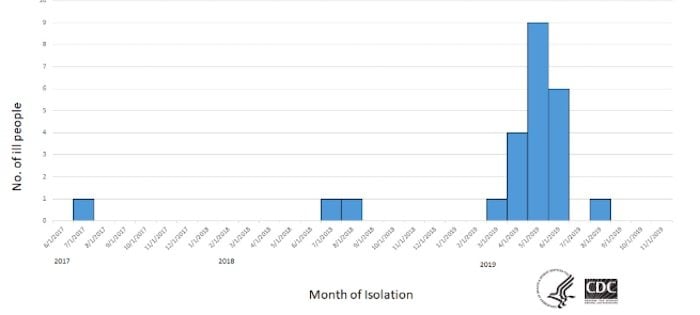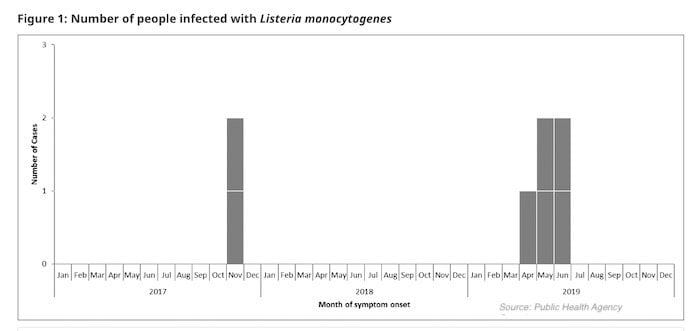The Centers for Disease Control and Prevention (CDC) has ended its investigation of a Listeria outbreak that sickened 24 people killing two of them. The agency’s announcement today that it would be wrapping up its investigation came two and a half months after its only previous report on the outbreak and revealed no new information.
The agency stated that it had interviewed the people sickened but could not identify “a specific food item, grocery store, food processor, or restaurant chain as the source of infections.” The report doesn’t say if any food products were tested and if so if any of them were positive for the outbreak strain of Listeria. It also doesn’t say much about an outbreak in Canada caused by the same Listeria strain. And that’s where the two questions come in.


24 Sick, 2 Dead and a Couple of Questions
The charts above show the months of “symptom onset” for patients sickened in the U.S. and Canadian outbreaks. Both outbreaks had cases occurring between July and November of 2017 and between March and August of 2019. (The U.S. outbreak also includes two cases that occurred in 2018.) And even though the earliest illness reported occurred in the U.S. in July 2017, the story of both of these outbreaks begins in Canada.
The Canadian Cooked Chicken Listeria Outbreak
On August 18, 2019, the Candian Food Inspection Agency (CFIA) announced a recall by Rosemount Sales and Marketing of Waterloo, ON of Rosemount brand cooked, diced chicken that was potentially contaminated with Listeria. The recalled chicken had a pack date of 01/21/2019. The recall notice mentioned an investigation of illnesses by the Public Health Agency of Canada (PHAC). Rosemount Sales and Marketing is a brokerage company that represents meat and poultry manufacturers and has a private label operation to manufacture products that are then sold under a variety of brand names.
On August 19, 2019, PHAC announced an investigation of an outbreak that included seven illnesses in three provinces. The source of the outbreak was identified as Rosemount brand cooked diced chicken which had been supplied to institutions such as cafeterias, hospitals and nursing homes “where many of the individuals who became sick resided, or visited, before becoming ill.”
Fourteen more recalls in Canada followed these announcements. Some were derivative recalls, meaning they stemmed from the original – chicken sandwiches made with the recalled chicken, for example. Others arose from extensive testing of samples of various brands of cooked chicken PHAC and CFIA conducted. Their testing even led to recalls in the U.S., both by the same company, Tip Top Poultry of Rockmart, GA.
The U.S. Listeria Outbreak
At this point, it should be noted that one of the brand names featured on the Rosemount Sales and Marketing website is Tip Top. That’s not mentioned in government reports about either outbreak in either country.
On August 20, 2019, Tip Top announced it was recalling cooked, diced chicken with a pack date of 1/21/ 2019 and sold to hotels and restaurants nationwide under the brand names Tip Top, Perdue, Gordon, West Creek and Sysco. The Tip Top cooked chicken recall stated that the problem had been discovered by PHAC during its investigation of an outbreak.
Careful readers may have noticed that the pack date for the chicken in Tip Top recall is the same as the pack date for the chicken in the Rosemount recall in Canada. Listeria lawyer Fred Pritzker did.
“One thing investigators are likely looking at is that all of these recalls in both countries share a common “packed on” date,” Pritzker, founder of the national food safety law firm Pritzker Hageman, noted back in August
On August 23, 2019, the CDC announced that it was investigating a Listeria outbreak in the U.S. that had sickened 24 people killing two of them. In that announcement, the CDC stated that a genetic testing process called Whole Genome Sequencing showed that the outbreak strain closely resembled the outbreak strain in Canada. (They never use the term match.) And that these same tests showed all of the American case-patients had been sickened by the same strain which means they likely all ate the same contaminated food.

Back to those 14 Canadian recalls for a second. On September 27, 2019, CFIA announced another Rosemount recall for cooked chicken in Canada. Tip Top is one of the brand names mentioned for a diced cooked chicken product with a pack date of 7/29/19. It was named again in a September 30, 2019, Rosemount recall regarding “various imported cooked, diced chicken products.”
In between those two Canadian recalls, Tip Top issued a U.S. recall. A big one.
On September 28, 2019, the company recalled all of the frozen cooked, diced or shredded, ready-to-eat chicken products it produced between January 21, 2019, and September 24, 2019. All of the chicken the company produced over and eight-month period. The recall, posted on the U.S Department of Agriculture’s (USDA’s) website, said there had been no confirmed reports of illness.
Tip Top’s recall of eight months of product touched off a series of other recalls. Between October 1 and October 9 there were six derivative recalls for dozens of products sold under a variety of brand names that contained the chicken.
Two Questions
After the flurry of recalls in early October, we heard nothing more about the U.S. outbreak until today when the CDC announced the outbreak was over in a report that had no notable difference from the one issued in August except for the words “Final Update” at the top of the page. Twenty four people sick, two people dead. No further information.
In the absence of so much information, a lot of questions flood in to fill the void. Questions like the one attorney Fred Pritzker asked in August, Why is the pack date the same for the Tip Top and Rosemount recalls? Were environmental samples collected from the manufacturing and shipping areas tested? Was the same strain found in both? How many of the people who got sick ate a product containing cooked chicken? And so on.
But two key questions are:
According to Tip Top’s statement about the September recall, Tip Top products tested positive for Listeria five times during the investigation, were any of them a match for the outbreak strain?
Why is the only product/food testing information we have about this American outbreak from Canadian health officials?
Symptoms of a Listeria infection can take as long as 70 days to develop, about as long as the time between the initial Tip Top recall and the CDC announcement that the outbreak was over. If the USDA or the FDA were conducting product tests on foods that people in this outbreak ate, consumers should know that. If they weren’t conducting those tests, and just relying on Canada to do it, consumers should know that, too.
The Listeria lawyers at Pritzker Hageman represent people who have been sickened by contaminated food and families who have suffered the wrongful death of a loved one. If and would like to discuss a Listeria illness with our team, call 1 (888) 377-8900, send a text to 612-261-0856. Or, complete the form below. The consultation is free and there is no obligation.
